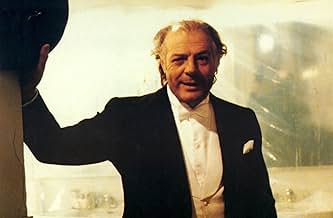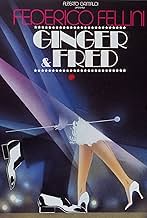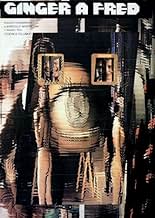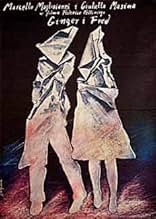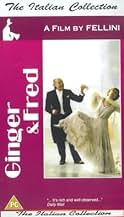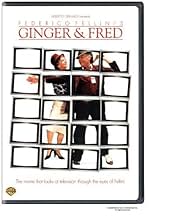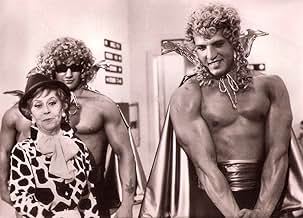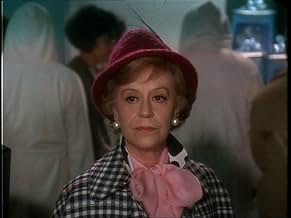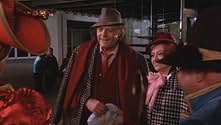IMDb-BEWERTUNG
7,2/10
5758
IHRE BEWERTUNG
Füge eine Handlung in deiner Sprache hinzuAmelia and Pippo are reunited after several decades to perform their old music-hall act on a TV variety show.Amelia and Pippo are reunited after several decades to perform their old music-hall act on a TV variety show.Amelia and Pippo are reunited after several decades to perform their old music-hall act on a TV variety show.
- Nominiert für 1 BAFTA Award
- 18 Gewinne & 18 Nominierungen insgesamt
Friedrich von Ledebur
- Admiral Aulenti
- (as Frederick Ledebur)
Jacques Henri Lartigue
- Brother Gerolamo
- (as Jacques Henry Lartigue)
Totò Mignone
- Totò
- (as Toto Mignone)
Antoine Saint-John
- Bandaged man
- (as Antoine Saint Jean)
Friedrich von Thun
- Kidnapped Industrialist
- (as Frederich Thun)
Antonino Iuorio
- Production Inspector
- (as Antonio Iuorio)
Empfohlene Bewertungen
This wasn't a bad film, though those without previous knowledge of Fellini's films may not like it as much. Giuletta Masina and Marcello Mastroani give their usual great performances. I actually thought Marcello gave one of his better performances here, in that he displayed a great comedic timing. I am mostly familiar with Fellini's pre-1970 films so I was not sure how a film made in the 1980's would do (given how much cinema had changed from the 50's/60's to the 80's), but he still delivers an enjoyable film, thanks in large part to good acting by the two leads. I enjoyed the satirical attack on television and the modern era (advertisting, etc.), which I happen to strongly agree with. The TV show scene near the end contains your typical Fellini "magic" and aesthetics, so I enjoyed that as well. This is by no means comparable to Fellini's masterpieces, but is still a well-made and enjoyable film, and more accessible than some of his more outrageous stuff he's made in past years. 7/10.
I think this is the last great Federico Fellini picture. Maybe it's not as classic as "I vitelloni", "La strada", "Le notti di Cabiria", "La dolce vita", "Otto e mezzo" and "Amarcord", but it's a return to a more comedy style and it's one of the most accessible works of the Maestro as well.
"Ginger e Fred" (1985) comes after a series of more experimental films from Fellini. In this satirical comedy about TV power, a couple of old dancers reunite for a Christmas show. They enter a world where everything is taken for making audience, the two and their art are just caricatures... But who cares? The only important thing is audience.
In this feature Fellini warns about TV dangers -in a very sarcastic way he anticipates what TV is today with all these Reality shows.
The film is a typical Fellini picture -the story has not a real plot, it's a voyage where strange people (also in a physical way!) meet, we always can find exaggerated and ambiguous situations...
At the same time there's a lot of tenderness between the two dancers, superbly played by Marcello Mastroianni (who starred in several Fellini works) and Giulietta Masina (the actual Fellini's wife). It's useless to say that the chemistry between the two main actors is rally great.
It's quite a nostalgic movie -it seems that Fellini looks back and thinks about a world in which fantasy and creativity could be expressed in a better way, whereas TV kills everything.
The two subsequent films of the Italian director ("Intervista" and "La voce della luna") are rather minor -although poetic they're not as fresh and simple as "Ginger e Fred".
We miss Federico, Giulietta and Marcello.
"Ginger e Fred" (1985) comes after a series of more experimental films from Fellini. In this satirical comedy about TV power, a couple of old dancers reunite for a Christmas show. They enter a world where everything is taken for making audience, the two and their art are just caricatures... But who cares? The only important thing is audience.
In this feature Fellini warns about TV dangers -in a very sarcastic way he anticipates what TV is today with all these Reality shows.
The film is a typical Fellini picture -the story has not a real plot, it's a voyage where strange people (also in a physical way!) meet, we always can find exaggerated and ambiguous situations...
At the same time there's a lot of tenderness between the two dancers, superbly played by Marcello Mastroianni (who starred in several Fellini works) and Giulietta Masina (the actual Fellini's wife). It's useless to say that the chemistry between the two main actors is rally great.
It's quite a nostalgic movie -it seems that Fellini looks back and thinks about a world in which fantasy and creativity could be expressed in a better way, whereas TV kills everything.
The two subsequent films of the Italian director ("Intervista" and "La voce della luna") are rather minor -although poetic they're not as fresh and simple as "Ginger e Fred".
We miss Federico, Giulietta and Marcello.
Fellini is perhaps the only director whose movies could never be adapted into books. The Maestro has invented a purely cinematic language to speak his own heart and tell his stories no matter how disjointed and anarchic they were for the discoverer, I guess his unique style would simply suffocate inside the restrictive format of words. Sure, drawings can give glimpses on his extravagant visions but still too static to convey the sense of fun and buoyancy he injects in his material. They could make interesting comic strips though but would they work the same without Nino Rota or Nicola Piavani's music?
Fellini movies are made for either the stage or the screen, their delights are essentially visual and musical, their enjoyment works on a sensitive and emotional rather than intellectual level. This is the old magic formula that made glorious days of Hollywood and Broadway, providing the kind of entertainment books and radio couldn't, that era immortalized by Chaplin, Laurel and Hardy, Walt Disney cartoons and of course musicals, and one of the most emblematic moments of that long gone period is Fred Astaire and Ginger Rogers dancing "Cheek to Cheek". That heavenly scene immortalized by countless homages, notably from "The Green Mile" and Woody Allen's "Purple Rose of Cairo".
Fellini's "Ginger and Fred" is impregnated with a similar dose of nostalgia although we never see the legends, we don't need their last names, we don't need the lyrics to remember "Top Hat", we don't need Giuletta Masina to look like Ginger Rogers and she doesn't even pretend to be a lookalike while Marcello Mastroianni isn't exactly the thin and slender Astaire type. Yet the two Hollywood stars bright through the sole passion of Amelia (Masina) and Pippo (Mastroianni). Listen to her describing the choreography or her days of glory during interviews or Pippo, in one of the film's most inspired scenes, explaining the origins of tap dancing. Their listeners aren't always captivated but we know they're not talking to them but to us movie lovers fascinated by these Last Mohicans of Hollywood Golden Age... Italian style.
The homage itself is pure Fellini style, any lesser director would have made this love letter to Hollywood a sort of solemn prosternation... watching "Ginger and Fred" made me realize how willing even good movies like "The Artist" or "La La Land" were to recreate the magic at the expense of their personal touch, sinning by moments of sentimental manipulation. "Ginger and Fred" is nostalgic all right, but it's exuberant and transgressive like any Fellini film. The director turns the couple into decoy protagonists in a crazy universe, an avalanche of debauchery that makes them totally outdated. Behind the nostalgia, there's a commentary on how far the art of entertainment went, becoming as decadent as his portrayal of Rome like in "Satyricon". Good directors flash the lost innocence before our eyes, Fellini focuses on the much groovier hell.
What is the place of a tap dancing couple in a world where TV and pop electronic music waters its audience with a keleidoscope of sex, games, ads and random images designed to ignite masses lowest instincts? When Amelia is approached by an unimpressed journalist and driven to the hotel before the studio representation, she is surrounded by so many characters her frailty is enhanced: has-been artists, lookalikes, impersonators, dwarves... what have they in common? They're just weird, bizarre-looking or entertaining in a non-traditional way. It's eerie how Fellini prophecized the reality shows and their exploitations of wannabe celebrities and pseudo artists treated like freaks. There's a scene where Amelia is asked whether she's married to Pippo, if she was, that would have interested the audience even more. There's no place anymore for genuine interest, people want to be shocked, dazzled, or surprised, it's a giant leap made in five decades.
Having a foot in each world and being a true ringmaster, Fellini reconciles these two schools of entertainment, allowing within that orgy of telegenic bizarreness a few breaks to Amelia and Pippo, I didn't mind these crazy vignettes as they're part of the Fellinian experience but sometimes they can be too exhausting and so I enjoyed these brief moments of truce where Amelia and Pippo shared a few memories. I loved their complicity all through their film and one of the masterstrokes was the blackout before the act, so we could breath a little and listen to them commenting the mess surrounding them. It's interesting to see that they're lucid about their status, but they are willing to give the audience what they want, for the sake of their art. For all its anarchical structure, carried by that catchy soundtrack, Fellini can't resist the temptation of sentimentalism and that's a wise choice, as he allows his two fetish actors to have a substantial role at the dawn of their career, he even recast Franco Fabrizi as the host show, he who starred in his early neo-realist films.
In its "final show before the curtain closes" undertones, "Ginger and Fred" reminded me of Chaplin's "Limelight". The film has its slower moments but it's surprisingly grabbing and never dull or boring, Amelia and Pippo gravitate around these bizarre figures of entertainments like a Greek chorus we can relate to. At the end, they become Ginger and Fred in our hearts. And the film ends as it started, but at night in a deserted train station, with the two actors paying the kind of goodbyes that resonate like poignant farewells. But at long as they saw each other, that mess was all worth it, and since there's no Fellini film without the "film in the film" element, at least Il Dottore gratified us with a last reunion with his fetish actors: Masina and Mastroianni ... if only for that, "Ginger and Fred" deserves to be watched and appreciated.
Fellini movies are made for either the stage or the screen, their delights are essentially visual and musical, their enjoyment works on a sensitive and emotional rather than intellectual level. This is the old magic formula that made glorious days of Hollywood and Broadway, providing the kind of entertainment books and radio couldn't, that era immortalized by Chaplin, Laurel and Hardy, Walt Disney cartoons and of course musicals, and one of the most emblematic moments of that long gone period is Fred Astaire and Ginger Rogers dancing "Cheek to Cheek". That heavenly scene immortalized by countless homages, notably from "The Green Mile" and Woody Allen's "Purple Rose of Cairo".
Fellini's "Ginger and Fred" is impregnated with a similar dose of nostalgia although we never see the legends, we don't need their last names, we don't need the lyrics to remember "Top Hat", we don't need Giuletta Masina to look like Ginger Rogers and she doesn't even pretend to be a lookalike while Marcello Mastroianni isn't exactly the thin and slender Astaire type. Yet the two Hollywood stars bright through the sole passion of Amelia (Masina) and Pippo (Mastroianni). Listen to her describing the choreography or her days of glory during interviews or Pippo, in one of the film's most inspired scenes, explaining the origins of tap dancing. Their listeners aren't always captivated but we know they're not talking to them but to us movie lovers fascinated by these Last Mohicans of Hollywood Golden Age... Italian style.
The homage itself is pure Fellini style, any lesser director would have made this love letter to Hollywood a sort of solemn prosternation... watching "Ginger and Fred" made me realize how willing even good movies like "The Artist" or "La La Land" were to recreate the magic at the expense of their personal touch, sinning by moments of sentimental manipulation. "Ginger and Fred" is nostalgic all right, but it's exuberant and transgressive like any Fellini film. The director turns the couple into decoy protagonists in a crazy universe, an avalanche of debauchery that makes them totally outdated. Behind the nostalgia, there's a commentary on how far the art of entertainment went, becoming as decadent as his portrayal of Rome like in "Satyricon". Good directors flash the lost innocence before our eyes, Fellini focuses on the much groovier hell.
What is the place of a tap dancing couple in a world where TV and pop electronic music waters its audience with a keleidoscope of sex, games, ads and random images designed to ignite masses lowest instincts? When Amelia is approached by an unimpressed journalist and driven to the hotel before the studio representation, she is surrounded by so many characters her frailty is enhanced: has-been artists, lookalikes, impersonators, dwarves... what have they in common? They're just weird, bizarre-looking or entertaining in a non-traditional way. It's eerie how Fellini prophecized the reality shows and their exploitations of wannabe celebrities and pseudo artists treated like freaks. There's a scene where Amelia is asked whether she's married to Pippo, if she was, that would have interested the audience even more. There's no place anymore for genuine interest, people want to be shocked, dazzled, or surprised, it's a giant leap made in five decades.
Having a foot in each world and being a true ringmaster, Fellini reconciles these two schools of entertainment, allowing within that orgy of telegenic bizarreness a few breaks to Amelia and Pippo, I didn't mind these crazy vignettes as they're part of the Fellinian experience but sometimes they can be too exhausting and so I enjoyed these brief moments of truce where Amelia and Pippo shared a few memories. I loved their complicity all through their film and one of the masterstrokes was the blackout before the act, so we could breath a little and listen to them commenting the mess surrounding them. It's interesting to see that they're lucid about their status, but they are willing to give the audience what they want, for the sake of their art. For all its anarchical structure, carried by that catchy soundtrack, Fellini can't resist the temptation of sentimentalism and that's a wise choice, as he allows his two fetish actors to have a substantial role at the dawn of their career, he even recast Franco Fabrizi as the host show, he who starred in his early neo-realist films.
In its "final show before the curtain closes" undertones, "Ginger and Fred" reminded me of Chaplin's "Limelight". The film has its slower moments but it's surprisingly grabbing and never dull or boring, Amelia and Pippo gravitate around these bizarre figures of entertainments like a Greek chorus we can relate to. At the end, they become Ginger and Fred in our hearts. And the film ends as it started, but at night in a deserted train station, with the two actors paying the kind of goodbyes that resonate like poignant farewells. But at long as they saw each other, that mess was all worth it, and since there's no Fellini film without the "film in the film" element, at least Il Dottore gratified us with a last reunion with his fetish actors: Masina and Mastroianni ... if only for that, "Ginger and Fred" deserves to be watched and appreciated.
Fellini takes a stab at television in this wonderful satire. It's Christmas, and an Italian "Ed Sullivan" type show is having a special, by re-uniting acts that were featured years ago. There is a hilarious (for those in the know) swipe at Woody Allen, who has been parodying Fellini for years. It's a bit deliberately paced, but the chemistry between the stars makes it worthwhile.
Federico Fellini is one of the greatest directors and screenwriters the world has ever seen...and that must be the biggest understatement of the century. He had the ability to take simple, real elements and transform them into a surreal, enchanting experience that speaks for itself without the aid of a complicated plot or a multi-million dollar production design (although that's not to say his films aren't visually breath-taking). Even though it's not one of his greatest masterpieces, "Ginger e Fred" is one such film that demonstrates his never-ending talent.
The main plot is as simple as it gets. Amelia and Pippo (Giulietta Masina and Marcello Mastroianni) are old friends who haven't seen each other for years, and in their youth, they were reasonably famous for their imitation of Ginger Rogers and Fred Astaire, doing their classic tap dancing and glamorous choreographies. Now, they're very old, but they're being invited by a big (and sleazy) TV station to perform in their epic Christmas program reenacting their age-old act. The film is about these two old people, seeing each other after so many years, and remembering those golden years when they were celebrated, important, and had the spark of love and friendship alive for each other.
They're not the only ones invited to the show, though. A huge cast of quirky and colourful characters also make their appearance, each one trying to grab their share of the spotlight performing sometimes interesting, sometimes plain stupid, acts and/or abilities and "amazing" stories. We see an (obviously) Fellini-esquire array of supporting freaks- the priest who renounced his vows to marry his lover, the monk who levitates, the singing slovenly dwarfs, Swedish townsfolk with their fifteen-tit cow, a transsexual who services an entire prison row and is being processed for it, a medium who listens to ghosts through a tape recorder...the list is endless. They all have odious, over-familiar dialogue which makes us relate to the grotesque things we think well of in life. Our heroes, Amelia and Pippo, are thrown in with this collection of freaks, and find themselves both hating and liking the situation they've accepted.
The images the film presents are as unusual and as surreal as we have come to experience through other Fellini films. The dialogue sounds casual and witty, but is continually spiked with longing, electricity, loathing and disenchantment. Our main characters speak and travel this (seemingly) alternate world they've entered and find it horrifyingly equal to that they live in. The way they all try to hog the spotlight, their unnatural addiction to TV and celebrities, the way they're all brainwashed through the televised images...Fellini makes a point on all of these. He also continually presents TV commercials about pork and meat, each commercial bearing a scantly-clad woman with a gruesome piece of meat and proclaiming it to be utterly delicious. The people believe it. We also see various posters and written advertisements with strange and slightly disturbing images for a variety of products that don't work, and proclaiming nothing but lies. People believe them.
We see two main characters, Amelia and Pippo, being likable characters trying to relive their friendship, trying to regain their previous vitality and trying to fit in with a series of "freaks" (in every sense of the word) in a world where greed, money, fame and awful manners have been allowed to run rampant. We see our main characters trying to quit their association with this distasteful universe only to be drawn in over and over again by a faint memory of fame, by an interlude with someone famous, by the expectations their friends have of them.
We, as the audience, feel happy to relate to these old friends who have met once again, and feel their angst. We also feel a certain repugnant hate for the rest of the characters, unfeeling beasts who (to our surprise and chagrin) also seem, each in their own way, very similar to us and the people that surround us. And what is all the more interesting is the way Fellini never even delves into the personalities of these characters (with the exception of Amelia and Pippo) but indirectly spends every second of the film injecting meaning and objection into them. The images, of course, speak for themselves.
Masina and Mastroianni are perfect in their roles, the music is both catchy and nostalgic, the costumes are...well, out of this world and the screenplay is both earthbound and ethereal. I couldn't understand the emotional implications of the ending, but I suppose that must be Fellini's point, to leave the audience thinking. And, believe me, this movie does get you thinking! And though it's definitely not one of Fellini's greatest, it still is entertaining and amusing to analyze.
Rating: 3 stars and a half out of 4!
The main plot is as simple as it gets. Amelia and Pippo (Giulietta Masina and Marcello Mastroianni) are old friends who haven't seen each other for years, and in their youth, they were reasonably famous for their imitation of Ginger Rogers and Fred Astaire, doing their classic tap dancing and glamorous choreographies. Now, they're very old, but they're being invited by a big (and sleazy) TV station to perform in their epic Christmas program reenacting their age-old act. The film is about these two old people, seeing each other after so many years, and remembering those golden years when they were celebrated, important, and had the spark of love and friendship alive for each other.
They're not the only ones invited to the show, though. A huge cast of quirky and colourful characters also make their appearance, each one trying to grab their share of the spotlight performing sometimes interesting, sometimes plain stupid, acts and/or abilities and "amazing" stories. We see an (obviously) Fellini-esquire array of supporting freaks- the priest who renounced his vows to marry his lover, the monk who levitates, the singing slovenly dwarfs, Swedish townsfolk with their fifteen-tit cow, a transsexual who services an entire prison row and is being processed for it, a medium who listens to ghosts through a tape recorder...the list is endless. They all have odious, over-familiar dialogue which makes us relate to the grotesque things we think well of in life. Our heroes, Amelia and Pippo, are thrown in with this collection of freaks, and find themselves both hating and liking the situation they've accepted.
The images the film presents are as unusual and as surreal as we have come to experience through other Fellini films. The dialogue sounds casual and witty, but is continually spiked with longing, electricity, loathing and disenchantment. Our main characters speak and travel this (seemingly) alternate world they've entered and find it horrifyingly equal to that they live in. The way they all try to hog the spotlight, their unnatural addiction to TV and celebrities, the way they're all brainwashed through the televised images...Fellini makes a point on all of these. He also continually presents TV commercials about pork and meat, each commercial bearing a scantly-clad woman with a gruesome piece of meat and proclaiming it to be utterly delicious. The people believe it. We also see various posters and written advertisements with strange and slightly disturbing images for a variety of products that don't work, and proclaiming nothing but lies. People believe them.
We see two main characters, Amelia and Pippo, being likable characters trying to relive their friendship, trying to regain their previous vitality and trying to fit in with a series of "freaks" (in every sense of the word) in a world where greed, money, fame and awful manners have been allowed to run rampant. We see our main characters trying to quit their association with this distasteful universe only to be drawn in over and over again by a faint memory of fame, by an interlude with someone famous, by the expectations their friends have of them.
We, as the audience, feel happy to relate to these old friends who have met once again, and feel their angst. We also feel a certain repugnant hate for the rest of the characters, unfeeling beasts who (to our surprise and chagrin) also seem, each in their own way, very similar to us and the people that surround us. And what is all the more interesting is the way Fellini never even delves into the personalities of these characters (with the exception of Amelia and Pippo) but indirectly spends every second of the film injecting meaning and objection into them. The images, of course, speak for themselves.
Masina and Mastroianni are perfect in their roles, the music is both catchy and nostalgic, the costumes are...well, out of this world and the screenplay is both earthbound and ethereal. I couldn't understand the emotional implications of the ending, but I suppose that must be Fellini's point, to leave the audience thinking. And, believe me, this movie does get you thinking! And though it's definitely not one of Fellini's greatest, it still is entertaining and amusing to analyze.
Rating: 3 stars and a half out of 4!
Wusstest du schon
- WissenswertesUpon the film's release in the USA, Ginger Rogers sued the production and the distributors for 'misappropriation and infringement of her public personality'. The case was dismissed, the judgment stating that the film referred to her and Fred Astaire only obliquely.
- Zitate
Pippo Botticella: Unquestionably, we descend from the apes. The trouble is we can't get back to them, to their gift of instinct, of natural innocence.
- VerbindungenFeatured in At the Movies: The Money Pit/Ginger and Fred (1986)
Top-Auswahl
Melde dich zum Bewerten an und greife auf die Watchlist für personalisierte Empfehlungen zu.
- How long is Ginger & Fred?Powered by Alexa
Details
- Erscheinungsdatum
- Herkunftsländer
- Sprachen
- Auch bekannt als
- Ginger & Fred
- Drehorte
- Produktionsfirmen
- Weitere beteiligte Unternehmen bei IMDbPro anzeigen
Box Office
- Bruttoertrag in den USA und Kanada
- 837.623 $
- Eröffnungswochenende in den USA und in Kanada
- 22.725 $
- 30. März 1986
- Weltweiter Bruttoertrag
- 837.953 $
Zu dieser Seite beitragen
Bearbeitung vorschlagen oder fehlenden Inhalt hinzufügen

Oberste Lücke
By what name was Ginger und Fred (1986) officially released in India in English?
Antwort

